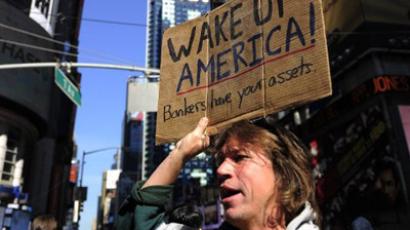Globe against the greedy: protests spill worldwide
Protests against economic mismanagement and corporate greed are going global. In addition to the Occupy Wall Street movement sweeping the US, protesters from over 70 European and Asian nations are set to hold co-ordinated mass rallies on October 15.
Activists from 78 nations, organizing themselves through the Internet and social networks such as Facebook and Twitter, are due to take to the streets on Saturday in a joint effort to protest at the crippling global economic crisis and hold politicians and bankers responsible. “United in one voice, we will let politicians and the financial elites they serve know it is up to us, the people, to decide our future,” reads the statement on the website for the upcoming protests, http://15october.net/. “We are not goods in the hands of politicians and bankers, who do not represent us,” it adds. According to the organizers, the protests will involve 868 cities in Europe, the United States, South America, Asia and Africa. Protests in the EU are focusing on unemployment and cuts in public services. The situation is particularly acute in debt-stricken countries like Greece where harsh austerity measures are being imposed in exchange for EU and IMF bailouts.RT’s correspondent Priya Sridhar, reporting from India, says Asian activists are planning to stage protests in Taipei, Seoul, Jakarta, Hong Kong and even the Pakistani capital, Islamabad. According to Sridhar, in India itself, there is a growing sentiment against big international corporations using the country’s cheap labor and resources for their benefit alone. “People here are a little bit suspicious of the multinational companies, specifically American companies,” she said. “Just recently I went to Hyderabad and met with some of the Maoists, who are a growing movement here in India. They are against globalization and their main point is that while the Indian economy might be growing, the rich in India are getting richer and the poor are getting poorer and it is the foreign corporations that are really benefiting from India’s young workforce and not India as a whole, and that is a point that I think has really struck accord with many people here in India, and it is not just the Maoists.” A mood of protest has also reached China, where capitalism-oriented reforms have not pleased the country’s socialists. According to Asia Times Online, the country’s new leftists are hailing the Occupy Wall Street movement as a “great revolution” against capitalism around the world. Chinese supporters of the OWS have reportedly staged street protests in at least two cities of Henan province – Luoyang and Zhengzhou – in recent days, to support the American movement, the source reports. Recent events in America have also sparked a heated online discussion in the country. On October 1, Chinese popular blogger Sima Pingbang uploaded a lengthy article saying events in the United States herald a global revolution that will bury capitalism. The leftist’s website, Utopia, has devoted a special page to the American movement and the “death of capitalism.” The Occupy Wall Street protests have been ongoing in the United States since September 17, spreading from New York to dozens of American cities including Boston, Chicago, Los Angeles, Seattle and Portland. While the protesters have often been accused of failing to present a focused message, discontent with growing economic inequality provides the unifying force for the ever-expanding movement. As RT’s Marina Portnaya reports, the most recent statistics have shown that one per cent of America’s population owns 40 per cent of the national wealth; the worst wealth inequality the country’s seen in 25 years. She also noted that the top one per cent, who take home some 25 per cent of America’s national income, also own half of the country’s stocks, bonds and mutual funds. Watch Marina Portnaya's report from New York















